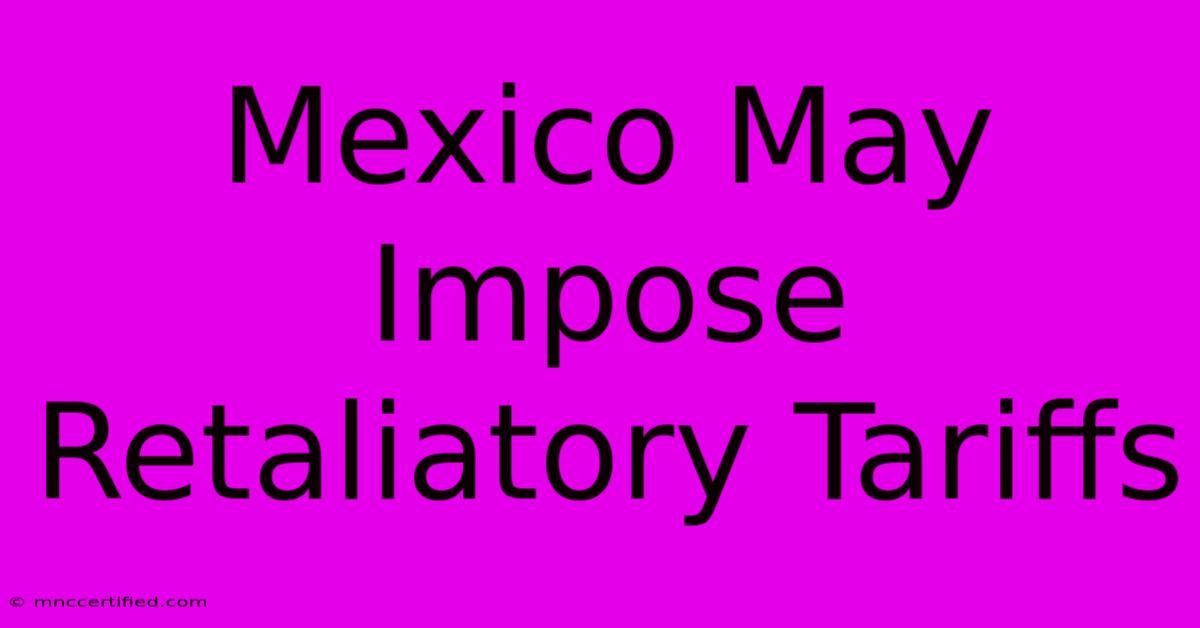Mexico May Impose Retaliatory Tariffs

Table of Contents
Mexico May Impose Retaliatory Tariffs: A Deep Dive into the Potential Economic Fallout
Mexico's potential imposition of retaliatory tariffs is a developing situation with significant implications for international trade and the global economy. This article delves into the potential reasons behind such a move, the likely targets, and the broader economic consequences. We will also examine how businesses can prepare for this uncertain landscape.
Understanding the Potential Triggers for Retaliatory Tariffs
Mexico's government might resort to retaliatory tariffs in response to perceived unfair trade practices from other countries. Several factors could trigger such a reaction:
-
Trade Disputes: Ongoing trade disputes, especially those involving significant Mexican exports like automobiles, agricultural products (such as avocados and tequila), and manufactured goods, could lead to retaliatory measures. If Mexico feels that another nation's tariffs or trade barriers are unjustified or violate international trade agreements, it may respond in kind.
-
WTO Rulings: Adverse rulings from the World Trade Organization (WTO) against Mexico could provide justification for retaliatory tariffs. If Mexico believes a trading partner is violating WTO rules and hasn't rectified the situation, imposing tariffs could be seen as a legitimate response.
-
National Security Concerns: While less likely to be the sole trigger, national security concerns related to specific imports could influence Mexico's decision. This is a complex area and often involves political considerations beyond pure economic factors.
-
Protection of Domestic Industries: A significant downturn in a key domestic industry, potentially caused by unfair foreign competition, might prompt the Mexican government to protect its businesses through retaliatory tariffs.
Potential Targets and Economic Impacts
The impact of Mexican retaliatory tariffs would heavily depend on the targeted country and the specific goods subject to the increased duties. Potential targets could include:
-
The United States: Given the significant bilateral trade relationship, the US is a likely candidate for retaliatory tariffs. This could particularly affect US exports of agricultural products, manufactured goods, and potentially vehicles.
-
Other Major Trading Partners: Countries like Canada, the European Union, and China could also face retaliatory tariffs if they are perceived to be engaging in unfair trade practices towards Mexico.
Economic consequences could be far-reaching:
-
Increased Prices for Consumers: Retaliatory tariffs would likely lead to higher prices for consumers in both Mexico and the retaliated-against country.
-
Reduced Trade Volumes: The tariffs could reduce the volume of trade between Mexico and the affected country(ies), harming businesses and potentially slowing economic growth.
-
Retaliation from Other Countries: The imposition of retaliatory tariffs could trigger further retaliatory measures from other countries, escalating trade tensions and creating a global trade war scenario.
-
Supply Chain Disruptions: Businesses relying on imports from the affected countries might face supply chain disruptions, impacting production and potentially leading to job losses.
Preparing for Uncertainty: Strategies for Businesses
Businesses operating in or trading with Mexico need to proactively manage the risks associated with potential retaliatory tariffs. Key strategies include:
-
Diversification of Supply Chains: Reducing reliance on a single supplier or country of origin is crucial to mitigate potential disruptions.
-
Close Monitoring of Trade Developments: Staying informed about evolving trade policies and regulations is essential for effective risk management.
-
Lobbying and Advocacy: Businesses should participate in industry associations and engage in lobbying efforts to influence trade policy decisions.
-
Scenario Planning: Developing contingency plans to address various potential scenarios, including tariff increases, is vital for business continuity.
-
Cost-Benefit Analysis: Businesses need to carefully analyze the cost-benefit of relocating production or sourcing from alternative locations.
Conclusion: Navigating a Complex Trade Landscape
The potential for Mexico to impose retaliatory tariffs highlights the complexity and volatility of the international trade environment. Understanding the potential triggers, likely targets, and economic impacts is crucial for both businesses and policymakers. Proactive risk management and strategic planning are essential to navigate this uncertain landscape and mitigate potential negative consequences. Further developments in this situation warrant constant monitoring from all stakeholders.

Thank you for visiting our website wich cover about Mexico May Impose Retaliatory Tariffs. We hope the information provided has been useful to you. Feel free to contact us if you have any questions or need further assistance. See you next time and dont miss to bookmark.
Featured Posts
-
Valdosta Insurance Valdosta Ga
Nov 27, 2024
-
Fc Barcelona Vs Brest Preview And Prediction
Nov 27, 2024
-
Man City Feyenoord Ucl Live
Nov 27, 2024
-
Non Owners Insurance Nc Online
Nov 27, 2024
-
First Responder Life Insurance
Nov 27, 2024